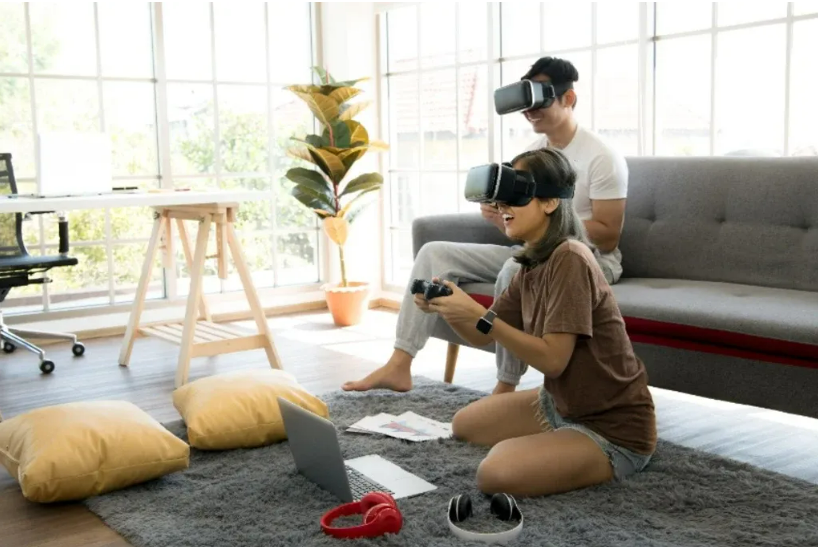How Singapore is gearing up for an ARVR future
Singapore’s Step into the ARVR Future
Meta has laid out its vision for the metaverse. Apple is rumored to be developing augmented reality (AR) and virtual reality (VR) glasses. ByteDance acquired Pico, a maker of VR headsets.
Against this backdrop, it’s clear that AR and VR are set to play a key role in enabling the future of an interconnected digital world.

Photo credit: amenic181 / 123RF
The concept of the metaverse is nothing new, but it has certainly come into the mainstream over the last year. In Asia Pacific, the AR/VR headset market is projected to more than double over the next five years, thanks to the wide range of use cases it brings.
Ng Kaijie, director of innovation at Singapore’s Infocomm Media Development Authority (IMDA), says some crucial driving forces have emerged that will likely accelerate development and growth in the space.
Enabling immersive technologies in Singapore
One factor powering the AR/VR wave is the arrival of 5G, which allows for greater bandwidth and lower latencies. This gives AR/VR the foundation to build even more immersive experiences and faster feedback.
“The experience can be more lifelike with better rendering and more detailed inputs and data and can support more users on the platform altogether,” says Ng.

Ng Kaijie, director of innovation at Singapore’s IMDA / Photo credit: IMDA
The hardware required to support AR/VR – think devices such as the Oculus headset – have also become more advanced and more affordable. At the same time, industries like healthcare and manufacturing have begun tapping into these technologies for purposes like training and simulations.
Ng believes that people today are much more open to interacting and working with one another virtually as a result of Covid-19.
Seeing the demand for AR/VR and the potential for these technologies to transform industries, Singapore has put in place various avenues of support for startups in the space. This includes innovation support such as the IMDA Pixel Innovation Hub, which offers a wide range of support such as an AR/VR lab, a 5G test bed, as well as access to business opportunities and workshops on design thinking and user design.
Digitalizing industrial workflows
One company that was incubated at the Pixel Innovation Hub is workflow automation firm Augmenteed. Founded in 2019, it helps companies digitalize industrial procedures.
According to founder and CEO Erwan Bodescot, digitalization in the industrial sector is still in its early days, and many still rely on paper-based processes to complete everyday tasks. Training can also be difficult and expensive, and when issues occur, companies only have a handful of experts to turn to for help, most of whom come from overseas.
“It’s extremely difficult to find an expert who has worked 30 years in the same company, in the same environment, and with the same processes,” Bodescot adds.

Erwan Bodescot, founder and CEO of Augmenteed / Photo credit: Augmenteed
Augmenteed’s no-code platform compensates for these challenges. The firm allows companies to create digital processes for standard operating procedures and maintenance and repair workflows. This enables its customers to have all the information they need for a particular task that’s accessible via a digital platform. It also uses AR to allow experts to provide support remotely, enables safe training for new workers, and can map over real-world objects to showcase how to address a problem at hand.
However, while the firm had a great solution, it struggled to get customers on board – Covid-19 limited its ability to meet with potential partners.
IMDA’s Pixel Innovation Hub played a crucial role in helping the firm navigate these challenges. Through regular informational webinars, workshops, networking events, and demo days, Pixel connected Augmenteed with potential customers, such as the Advanced Remanufacturing and Technology Centre, which falls under Singapore’s Agency for Science, Technology and Research. Augmenteed was also able to join panel discussions at events such as the JTC LaunchPad TechFiesta, where it was able to pitch its services to potential clients and investors.
The startup also participated in IMDA’s Open Innovation Platform and was selected as a finalist in January 2022. Participating in the program allowed it to work with training and certification firm BSI Singapore and helped open more doors to potential customers.
According to Bodescot, startups need to be alert to any opportunity that comes their way, and IMDA has helped facilitate such opportunities.
“As an example, IMDA frequently hosts tours of the Pixel building for corporates,” he shares. “We seize the opportunity to present what we do at Augmenteed, and it’s not rare that we can lock in a meeting with [these companies].”
Making AR/VR an immersive experience
Another firm that benefited from Pixel’s network is spatial technology company Virspatial. The firm’s main product is its digital twin technologies, which enables organizations to create digital models of factories, buildings, and even cities. It aims to create engaging experiences to fully immerse customers in these digital worlds.
In order to allow users to experience and understand information in a 3D, interactive form, Virspatial knew that it would have to focus on creating rich content and experiences that can closely mimic the real world.
“Consumers of the future will be more interested in ways they can have AR/VR as part of their everyday lives,” says Gavin Gui, managing director at Virspatial. “To do so, we want to provide a more visceral experience for our users, which helps them better understand the dynamics of the digital twin and the value it can bring to their business and work life.”

Gavin Gui, managing director of Virspatial / Photo credit: Virspatial
However, Virspatial faced challenges in personalizing its solutions for customers at scale. Establishing concrete, repeatable use cases proved to be a hurdle, as was attracting the right global talent to develop solutions and build business traction.
By participating in events organized by IMDA Pixel, Virspatial saw growth in brand exposure, which led to more avenues for networking and support from industry specialists, especially in areas such as energy and aviation. This has allowed the firm to understand the needs of each industry and learn how to best position itself to convey its business value to customers.
Virspatial also benefited from IMDA’s Tech Acceleration Lab, which helps startups secure government-led projects and shorten the time needed to complete proof-of-concept cycles.
“With more outreach channels, we’ve grown our business capability, accessed more resources and talent, and connected with more industry partners,” says Gui.
An AR/VR future awaits
While the mass adoption of AR/VR technology may be a ways off, Bodescot and Gui believe that this will change.
There are new innovations in terms of the devices and ecosystems available, and these will drive the use of AR/VR for enterprises – though they believe consumer adoption remains limited in the near future.
“Thanks to hardware cost reductions, we’re expecting to see more industrial use cases such as task or team collaboration, product full lifecycle management, command control, decision making, and having a single source of data for enterprises,” says Gui. “Both hardware and software need to come hand in hand for AR/VR technology to advance further. Only then can we explore and discover more use cases beyond industrial applications.”
But it’s only the beginning. In the next five years, greater connectivity and access to rich data will enhance what AR/VR technologies can do.
Bodescot is particularly looking forward to the improvement in the human-machine interface, which is where the user experience will be dramatically transformed. He points to online shopping as an example of where this could have an impact.
“Our devices are going to evolve to simplify the processes involved and make it more fluid for users,” he says. “They’ll be able to suggest things based on who you are, understand exactly what you are looking for, and help you make even more informed decisions.”
IMDA Pixel is a 28,000 square-foot innovation hub that aims to help startups scale through innovative solutions. It supports startups working on the latest technologies such as AR, VR, AI, IoT, 5G, and robotics by connecting them with potential clients and partners through its innovation community. In addition to providing a complimentary co-working space, it also offers networking opportunities through events and workshops.
Find out more about IMDA Pixel and how it can help your startup here.
Source: Tech In Asia

